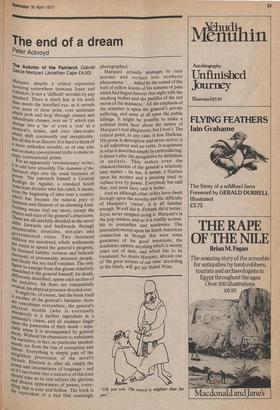The end of a dream
Peter Ackroyd The Autumn of the Patriarch Gabriel Garcia Marquez (Jonathan Cape £4.50) ,Marquez, despite a critical reputation hovering somewhere between Joyce and Nabokov, is not a 'difficult' novelist by any standard. There is much less in his work than meets the horrified eye, as it swivels over acres of close print, over sentences
Which arch and loop through clauses and
subordinate clauses, over an 'I' which can Change into a 'he' or even a 'you' at a Moment's notice, and over time-scales Which shift continually and inexplicably. But all this is an illusion. It is hard to think of a more orthodox novelist, or of one who uses so many conventional tricks to make so many conventional points.
,
For an apparently `revolutionary' writer, t„t is odd how smoothly The Autumn of the ratriarch slips into the usual fantasies of Power. The patriarch himself is General ,,
"drigo de Aguilar, a standard South American dictator who has ruled, it seems,
from the beginning of time over a country Which has become the natural prey to fantasies and illusions of an alarming kind.
Nothing seems real any more, except the These and sizes of the general's obsessions. 'hese are all carefully detailed inthe novel Shifts forwards and backwards through
Innumerable atrocities, miracles and goyernmental crises. Two thousand Children are murdered, whole settlements
his razed to speed the general's progress,
h..% licensed butcher tortures and beheads thousand of presumably innocent people, ,and finally the sea itself vanishes. The only
time to emerge from this gloom relatively differently is the general himself; his death,
jfferently described, opens each section of the narrative, his fears are romantically evoked,
It his physical presence drooled over, might be, of course, that the book itself Is another of the general's fantasies: there are concubines everywhere, the general's
Physical double (who is eventually Murdered) is a perfect ingredient in a _Paranoid's vision, and all madmen linger
Ton the panorama of their death — espeally when it is accompanied by general decay. Without his obsessions to unbalance the narrative, in fact, no particular incident stands out from the run of corruption and failure. Everything is simply part of the w_,eightless procession of the novel's
rhetoric. Rhetoric is, after all, simply the Pomp and circumstance of language — and SO h inevitable that a narrative of this kind Should ould take as its real subject the glorious and diverse appearances of power, every.,Mg that is easy and hollow. The book is the equivalent of a bad film stunningly
photographed.
Marquez actually manages to turn murder and torture into aesthetic phenomena: `.. . lulled by the sound of the trail of yellow leaves of his autumn of pain which had begun forever that night with the smoking bodies and the puddles of the red moon of the massacre.' All the emphasis of the sentence is upon the general's private suffering, and none at all upon the public killings. It might be possible to make a political point here about the nature of Marquez's real allegiances, but I won't. The critical point, in any case, is less libellous. His prose is descriptive and never active; it is all adjectives and no verbs. It acquiesces in what it describes simply by embroidering; it doesn't alter the perspective by definition or analysis. This makes even the characterisation of the general a relatively easy matter — he has, it seems, a fixation upon his mother and a pressing need to replace love by power. Everybody has said that, and most have said it better.
And so although other critics have dwelt lovingly upon the novelty and the difficulty of Marquez's 'vision', it is all familiar enough. Woolf did it; Firbank did it better; Joyce never stopped doing it. Marquez's is the pop version, and so it is readily accessible to journalists and academics. The journalists swoop upon his South American connection as though this were some guarantee of his good intentions; the academics admire anything which is twenty years out of date, and which has to be translated. No doubt Marquez, already one of 'the great writers of our time' according to the blurb, will get his Nobel Prize.


































 Previous page
Previous page